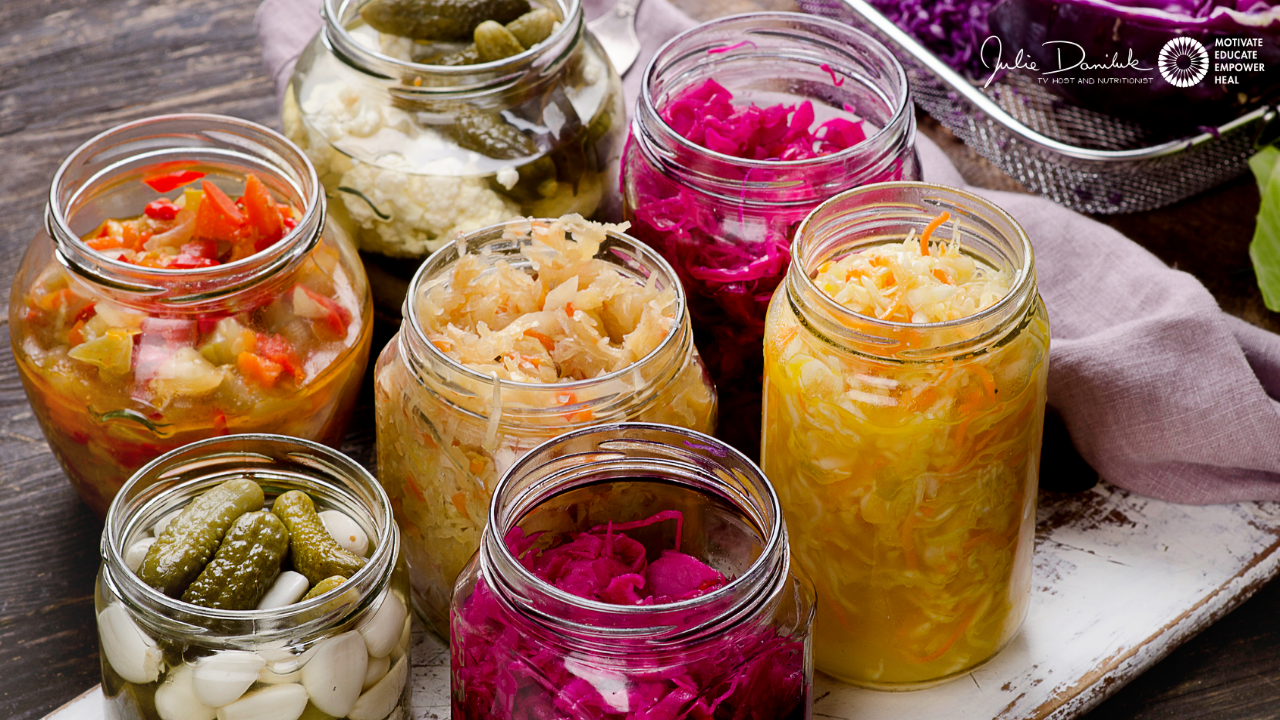Fermented Foods | Teeming With Probiotics For a Healthy Gut

Do you want a secret to preserving your health?
It turns out that traditional methods of preserving food teem with health benefits. People the world over continue to enjoy the tangy flavour of fermented foods – even well after refrigeration has done away with fermenting being one of the few ways to keep food from spoiling. Being Ukrainian, I was raised watching my grandma preparing sauerkraut. In India, it's common to enjoy lassis, a delicious yogurt drink. Pickled fermentations of cabbage, turnips, cucumbers, onions, squash and carrots are common throughout Asia. Northern Europeans are known for high consumption of yogurt and kefir, and its effects on longevity.
Natural pickling may mean that you get more out of your food!
There is a higher bioavailability and activity of nutrients in fermented foods. The digestibility of nutrients is improved thanks to the bacteria found in these foods.2 The fermentation of fibre-rich components produces active compounds that have a positive impact on your immune system and blood sugar levels, and are anti-inflammatory.1 A study has found that fermented homemade vegetable juices contain a higher mineral content (iron, zinc, manganese, copper), 16% more soluble iron and a decrease in phytates (which inhibit the absorption of iron).3 Among other nutrients critical for well-being found in fermented foods are Vitamin B12 and folate.4 Plus, fermenting preserves and enhances Vitamin C and the B vitamins.4

Fermented foods can help ease anxiety and other mental health concerns.
Yes, the bacteria in your gut can explain your mood due to the gut-microbiota-brain connection. Studies have shown that when you eat fermented food products regularly, you have a lower risk of anxiety and depression. In addition, it increases the available GABA content significantly (GABA is a messenger in your brain that helps to reduce anxiety).1
Fermented foods can help reduce the risk of certain cancers.
By increasing beneficial bacteria (which in turn will detoxify carcinogens), fermented foods produce compounds that are important for programmed cell death (aka apoptosis – really important in killing cells that are abnormal/cancerous) and increasing the health of your immune system.2 Lactobacillus acidophilus is an important probiotic that has demonstrated the ability to decrease polyps (can be a precursor to cancers), adenomas and colon cancers.2
The introduction of beneficial bacteria from fermented foods benefits your digestive system and immune system.
Since the GI tract is an important component of your immune system (because it contains MALT (mucosa-associated lymphoid tissue) which is the largest part of the immune system), these two go hand-in-hand. Enhanced immunity and increased resistance to some infections are also benefits of eating fermented foods. They can, in fact, reduce the incidence and duration of respiratory tract infections. 5

Fermented foods have an anti-inflammatory effect and can help decrease allergies. 6
When your GI tract is inflamed, it can allow substances to cross your intestinal wall, leading to inflammatory conditions outside of the GI tract (arthritis, for example).2 These food products have been shown to up-regulate anti-inflammatory cytokines such as interleukine-10.2 A study using probiotic cereal has been shown to prevent early allergies through T-cell-mediated immune response (balanced TH1/TH2 ratio).5 Fermented foods can also help alleviate symptoms of a milk protein allergy through better lactose hydrolysis.2
What To Try Making A Homemade Fermete?
Click the photo below to access a delicious recipe from my third book, Hot Detox called Pretty Purple Sauerkraut.
References
- Selhub E., Logan A., Bested A. “Fermented foods, microbiota, and mental health: ancient practice meets nutritional psychiatry” Journal of physiological Anthropology (2014); 33: 1-12.
- Parvez S., Malik K., Kang S., Kim H. "Probiotics and their fermented food products are beneficial for health" Journal of Applied Microbiology (2006); 100: 1171-1185.
- Bergqvist S., Sandberg A., Carlsson N., Andlid T. “Improved iron solubility in carrot juice fermented by homo-and-hetero-fermentative lactic acid bacteria”. Food Microbiology. (2005); 22: 53-61.
- Shockey K., Shockey C. Fermented Vegetables: Creative recipes for fermenting 64 vegetables and herbs. North Adams: Storey Publishing. 2014. Print.
- Chilton S., Burton J., Reid G. “Inclusion of fermented foods in food guides around the world” Nutrients (2015); 7: 390-404.
- Cross M., Stevenson L., Gill H. “Anti-allergy properties of fermented foods: an important immunoregularoty mechanism of lactic acid bacteria?” International Immunopharmacology (2001); 1:891-901.


